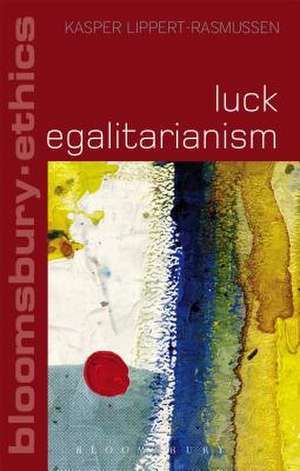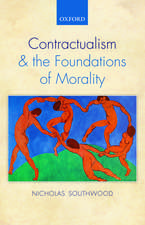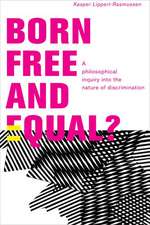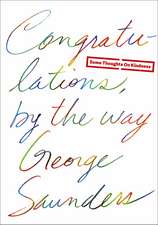Luck Egalitarianism: Bloomsbury Ethics
Autor Kasper Lippert-Rasmussenen Limba Engleză Paperback – 7 oct 2015
| Toate formatele și edițiile | Preț | Express |
|---|---|---|
| Paperback (1) | 178.65 lei 6-8 săpt. | |
| Bloomsbury Publishing – 7 oct 2015 | 178.65 lei 6-8 săpt. | |
| Hardback (1) | 568.32 lei 6-8 săpt. | |
| Bloomsbury Publishing – 7 oct 2015 | 568.32 lei 6-8 săpt. |
Preț: 178.65 lei
Preț vechi: 207.00 lei
-14% Nou
Puncte Express: 268
Preț estimativ în valută:
34.19€ • 35.01$ • 28.44£
34.19€ • 35.01$ • 28.44£
Carte tipărită la comandă
Livrare economică 19 martie-02 aprilie
Preluare comenzi: 021 569.72.76
Specificații
ISBN-13: 9781472570420
ISBN-10: 1472570421
Pagini: 280
Dimensiuni: 138 x 216 x 23 mm
Greutate: 0.34 kg
Editura: Bloomsbury Publishing
Colecția Bloomsbury Academic
Seria Bloomsbury Ethics
Locul publicării:London, United Kingdom
ISBN-10: 1472570421
Pagini: 280
Dimensiuni: 138 x 216 x 23 mm
Greutate: 0.34 kg
Editura: Bloomsbury Publishing
Colecția Bloomsbury Academic
Seria Bloomsbury Ethics
Locul publicării:London, United Kingdom
Caracteristici
The first introductory book-length treatment of luck egalitarianism
Notă biografică
Kasper Lippert-Rasmussen is Professor of Political Theory at the University of Aarhus, Denmark and Professor II in Philosophy at the University of Tromsø, Norway. His most recent book is Born Free and Equal? A Philosophical Inquiry into the Nature of Discrimination (2013).
Cuprins
Chapter 1. Luck egalitarianism and some close and distant relatives1.1 Introduction1.2 What is luck egalitarianism?1.3 What is attractive about luck egalitarianism?1.4 Three important luck egalitarians: Dworkin1.5 Three important luck egalitarians: Arneson1.6 Three important luck egalitarians: Cohen1.7 Luck egalitarianism and other views1.8 SummaryChapter 2. Why equality?2.1 Introduction2.2 Formal equality2.3 Equality of human beings2.4 Williams on the idea of equality2.5 Rawls on range properties2.6 Respect and opaqueness2.7 A different proposal2.8 SummaryChapter 3. Luck 3.1 Introduction3.2 Different kinds of luck3.3 Thin luck3.4 Thick luck3.5 Independent notions of luck3.6 How much luck is there?3.7 Constitutive luck3.8 Option luck versus brute luck3.9 Neutralizing luck and equality3.10 Bad luck versus good luck3.11 SummaryChapter 4. Equality of what? 4.1 Introduction4.2 Welfare4.3 The specification objection4.4 The disability objection4.5 The offensive preference objection4.6 The experience and snobbish tastes objection4.7 The non-instrumental concern objection4.8 Dworkin's resourcist view4.9 Sen's capability metric4.10 Summary Chapter 5. Telic and deontic luck egalitarianism 5.1 Introduction5.2 Some distinctions5.3 Telic versus deontic and the scope of equality5.4 The levelling down objection5.5 Telic egalitarianism and the levelling down objection5.6 Deontic egalitarianism and the levelling down objection5.7 Egalitarian responses5.8 SummaryChapter 6. The scope of luck egalitarianism 6.1 Introduction6.2 Whole lives6.3 Generations6.4 Groups6.5 States6.6 Individuals who are neither persons nor human beings6.7 SummaryChapter 7. Social relations egalitarianism versus luck egalitarianism 7.1 Introduction7.2 Social relations egalitarianism7.3 Anderson's democratic equality7.4 Humiliation and harshness7.5 What is at stake?7.6 The source of the disagreement between social relations and luck egalitarians?7.7 SummaryChapter 8. Other values 8.1 Introduction8.2 Freedom8.3 Demandingness8.4 Community8.5 Publicity and stability8.6 Reflections8.7 ConclusionBibliographyIndex
Recenzii
This brilliant and challenging book . Illuminates different conceptions of luck, as found in the philosophical literature, clarifies the difference between telic and deontic equality, and explains the 'levelling down' problem and the way that this affects luck egalitarians, and egalitarians more generally.
Lippert-Rasmussen's book offers both a reliable and critically sophisticated guide to the debate on luck egalitarianism from one of its shrewdest and most subtle contributors, and also advances several new interesting ideas and proposals ... This book is a model of its kind. It should be read by everyone with an interest in contemporary debates on distributive justice.
The book provides a well-balanced overview of luck egalitarianism with a well-chosen ordering of the different chapters ... An excellent introduction.
Lippert-Rasmussen's book makes a tremendous contribution to our understanding of luck egalitarianism and will no doubt become a central reference point for both its proponents and its critics.
Lippert-Rasmussen's book offers both a reliable and critically sophisticated guide to the debate on luck egalitarianism from one of its shrewdest and most subtle contributors, and also advances several new interesting ideas and proposals ... This book is a model of its kind. It should be read by everyone with an interest in contemporary debates on distributive justice.
The book provides a well-balanced overview of luck egalitarianism with a well-chosen ordering of the different chapters ... An excellent introduction.
Lippert-Rasmussen's book makes a tremendous contribution to our understanding of luck egalitarianism and will no doubt become a central reference point for both its proponents and its critics.



































